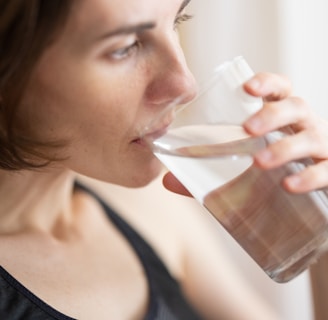Drink Water at the Right Time: The Secret to Better Health and Energy
Discover the optimal times to drink water throughout the day to boost your metabolism, aid digestion, and enhance your energy levels. Timing is everything.
HEALTHBLOG-LIST
Narcisse Bosso
9/18/20254 min read


In brief:
We all know we should drink enough water, but the timing is often overlooked. It's not just about quantity; it's about when you hydrate. Drinking water at specific times of the day can amplify its benefits, supporting everything from your metabolism to your brain function. This article outlines a simple, effective hydration schedule to help you get the most out of every glass of water.
Table of Contents
The Science of Timing Your Hydration
Time 1: Morning Wake-Up
Time 2: Before Meals
Time 3: Before a Workout
Time 4: Before a Shower
Time 5: Before Bed
A Simple Daily Hydration Schedule
FAQ: Water Timing
Conclusion
1. The Science of Timing Your Hydration
Your body's needs for water aren't constant; they change throughout the day based on your activities and metabolic processes. Drinking water at strategic moments helps your body perform key functions more efficiently. Just as you wouldn’t fuel your car at the end of a trip, you can optimize your body's performance by hydrating when it needs it most. This simple change in habit can have a significant impact on your energy levels, digestion, and overall well-being.
2. Time 1: Morning Wake-Up
Your body has gone without water for 7-8 hours during sleep. Drinking a large glass of water first thing in the morning is one of the most important things you can do. It rehydrates your body and kickstarts your metabolism, helping to flush out toxins that have built up overnight. This simple habit can boost your alertness and energy, making it a great alternative to reaching for coffee first thing in the morning.
3. Time 2: Before Meals
Drinking a glass of water about 30 minutes before a meal can significantly aid your digestion. It helps prepare your stomach for food by stimulating the production of digestive juices. Additionally, this timing can help you feel fuller, which may prevent overeating and support weight management goals. Avoid drinking large amounts of water with your meal, as it can dilute those same digestive juices and slow down the process.
4. Time 3: Before a Workout
Hydrating before exercise is crucial for a successful session. Drink water about an hour before your workout to allow your body time to absorb it. This helps lubricate your joints, prevent muscle cramps, and regulate your body temperature, which is essential for optimal performance and preventing dehydration. Carry a water bottle with you during your workout to stay hydrated as you go.
5. Time 4: Before a Shower
This might seem like an unusual tip, but drinking a glass of water before you take a shower can be beneficial. The act of showering, especially with warm water, can cause your blood vessels to dilate. Having a glass of water beforehand can help lower blood pressure, which is especially helpful for people with hypertension. It’s a small, easy-to-remember habit that supports cardiovascular health.
6. Time 5: Before Bed
While you don't want to overdo it and risk waking up for a bathroom trip, a small glass of water before bed is a good idea. It helps replenish fluids lost overnight and can help prevent a drop in hydration that could lead to headaches or muscle cramps. For some, it can even help reduce the risk of more serious issues like stroke and heart attack, as a body that is well-hydrated makes it easier for the heart to pump blood.
7. A Simple Daily Hydration Schedule
Here is a quick guide to implementing these tips into your daily life:
Upon waking: 1-2 glasses of water to rehydrate and kickstart your metabolism.
30 minutes before meals: One glass of water to aid digestion and promote satiety.
1 hour before workouts: A full glass of water to prepare your body for physical activity.
Before showering: One glass of water to support cardiovascular health.
Before bed: A small glass of water to replenish fluids overnight.
8. FAQ: Water Timing
1. Can I drink too much water? Yes, it's possible, though rare. Over-hydration can lead to hyponatremia, where sodium levels in the blood become too low. This is typically a concern for endurance athletes or in specific medical conditions.
2. Is it bad to drink water with my meal? A few sips are fine. The issue is drinking large amounts, which can dilute stomach acids and digestive enzymes, potentially slowing down digestion.
3. How do I know I'm drinking enough? The color of your urine is a good indicator. It should be a pale yellow or clear. If it's a dark yellow or amber, you likely need to drink more water.
4. Does coffee count? Coffee and tea contain water, but their diuretic effect can cause you to lose fluids. It's best to supplement your coffee intake with equal amounts of plain water.
9. Conclusion
Timing your water intake is a simple but powerful strategy for optimizing your health. By being intentional about when you hydrate, you can support your body's natural processes, enhance your energy levels, and improve your overall vitality. It's a small change with a big payoff.
Authentic Scientific Sources:
Mayo Clinic: Clinical information and patient guides on hydration, metabolism, and cardiovascular health.
American Heart Association: Guidelines and educational resources on the role of hydration in maintaining heart health.
National Center for Biotechnology Information (NCBI) / PubMed: Peer-reviewed studies on the physiological effects of water intake, including its impact on metabolism and athletic performance.
Written by Narcisse Bosso, certified naturopath. His lifelong passion for health became a profound calling after a loved one passed away from a natural illness that could have been prevented with simple lifestyle changes and habits.
